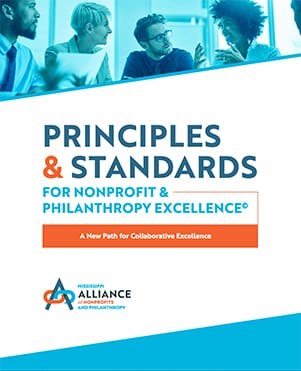Principles & Standards
For Nonprofit & Philanthropy Excellence
The 12 Accountability Principles
Key Terms & Definitions
501(c)(3)
Designation by the Internal Revenue Service that recognizes nonprofit and philanthropic organizations as exempt from federal income taxes and eligible to receive tax-deductible contributions. Tax-exempt organizations must comply with specific federal regulations in order to retain their status. This 501(c)(3) designation allows contributors (individuals and corporate entities) to claim a tax deduction on donations of cash, goods and services to the exempt organization. A tax-exempt organization is not required to pay income tax except on income unrelated to the organization’s exempt purpose.
Advocacy
Publicly supporting or recommending a particular cause or policy (not a candidate or political party) that impacts your constituents.
Board/Board of Directors
The elected, governing body of a nonprofit organization. The board of directors of a nonprofit has fiduciary responsibility for the mission, vision, monies and programs of a nonprofit organization. (Trustees is another term for board of directors)
CEO
The Chief Executive Officer is the administrative head of the organization, hired by the board to manage the resources and programs of a nonprofit. This position is most frequently called executive director, but sometimes called president (when there is a designated “board chair” position).
Code of Ethics
A general outline of broad ethical principles, unique to an individual or organization that usually includes values, behavior and overall standards of conduct.
Conflict of Interest
A situation when someone has competing professional or personal interests that make it difficult to fulfill his/her duties fairly and objectively on behalf of an organization.
Diversity
Having a wide range of characteristics of either individuals or groups within your organization including, but not limited to ethnicity, race, age, physical and cognitive abilities, family status, lifestyle preferences, socioeconomic status, religious and spiritual values and geographic location.
Electioneering
To actively work for or publicly endorse a specific candidate or a political party. (501(c)(3) nonprofits are prohibited from endorsing political candidates or parties.)
Executive Director
The highest level paid staff person who has over-all responsibility for managing the programs, personnel, and finances of a tax-exempt organization.
Director
This term is most often used to title an individual member on the board of directors. It is sometimes used interchangeably for the term executive director.
Fiduciary
The responsibility of holding something of value in trust for another. The board of directors of a nonprofit has fiduciary responsibility for the mission, vision, monies and programs of a nonprofit organization and to maintain the public trust.
IRS
This is the acronym for the Internal Revenue Service, the taxing body of the federal government.
Lobbying
An attempt to influence government action or decision-making through written or oral communications. Nonprofits are allowed to lobby within certain legal and regulatory guidelines.
Mission
A single, enduring, compelling statement that clearly suggests, in succinct terms the purpose, values, priorities and reason a nonprofit was founded and why it exists today.
Nonprofit/philanthropy (or nonprofit agency)
Common term for organizations established to serve the public good. Usually they secure the 501(c)(3) tax-exempt status from the Internal Revenue Service and incorporate as a nonprofit/charity corporation with the Mississippi Secretary of State.
Operational Plan
The short term (one to two years) goals, objectives and tasks that describe the strategies a nonprofit will use to fulfill its strategic plan.
Risk
Essentially, risk is the chance of something going wrong and the danger that injury, damage or loss will occur as a result of a decision or activity. (Example: The risk of fire or an auto accident.)
Risk Management
This is putting into place policies, practices and procedures to reduce the level of risk or the likelihood that injury, damage or loss will occur.
Secretary of State (Charities Division)
This is the official State regulatory body for charities and nonprofit in the state of Mississippi. Charity registrations and compliance issues are supervised by this office.
Strategic Plan
A long term (three to five years) plan that identifies and attempts to answer three questions using information gathered from stakeholders both internally and externally to the organization: Where are we now? Where do we want to be? How will we get there?
Tax-Exempt
Nonprofits are considered exempt from paying federal (and state) income taxes on year-end surpluses, except for unrelated business income. Nonprofits in Mississippi are not exempt from paying sales tax on certain purchases unless specifically given the exemption by the state tax commission.
Trustees
The board of directors is also called “trustees” of the organization, meaning that both the public trust and financial trust are the responsibility of the board.

